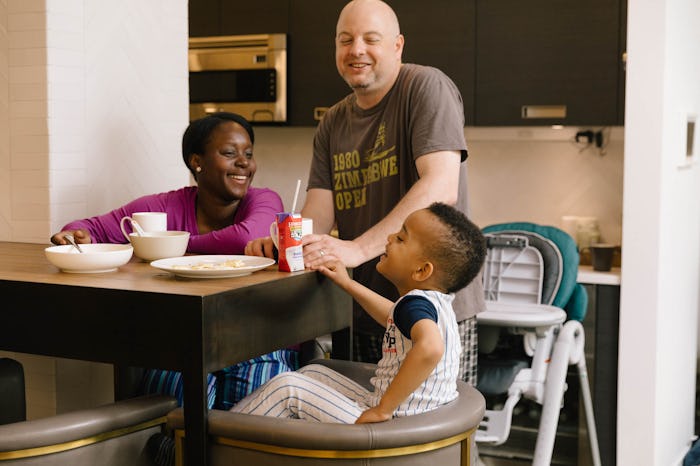Life
Here's Why Praising Your Child For Eating Dinner Is Problematic, According To Experts
It wasn't until I began breastfeeding my daughter that I realized the joy of watching a child find nourishment from food. Not only do you feel satisfaction as a parent about giving them what their bodies need, but it's amazing to watch them grow as a result. Even though Claire is now 2 years old and no longer nurses, I love to watch her eat, her rounded belly full with her favorites. But should I avoid phrases like, "I'm so proud of you!" when talking about her food habits? Maybe. Is it OK to praise your child for eating dinner, or does it brew bad habits?
"As caregivers, we need to be cautious not to associate foods with moral characteristics, such as labeling certain food items or food groups as 'good' or 'bad,'" Johanna Kandel, founder and CEO of The Alliance for Eating Disorders Awareness, tells Romper in an email interview. "A child may, in turn, internalize this narrative and feel inherently good or bad for their choices in food. It is important to help children recognize their internal cues and understand balance."
Kandel, who is also the author of Life Beyond Your Eating Disorder, explains that using food as a reward system may also have the potential to disrupt a child's ability to listen to their body’s cues (e.g. intuitive eating), leading to them eating when they are not hungry or eating past their point of fullness. "If you lose touch with your innate responses to eat when your body is hungry and stop eating when you reach a comfortable fullness, you may later develop maladaptive behaviors of eating food or restricting intake based on an emotional response."
Dr. Michelle Davenport, co-founder of Raised Real, says the only time she suggests offering praise is when a child tries something new, but even then it’s validation, and not so much praise. She says you should say something like, "Wow, you tried something new! I saw you eat that for the first time. What did you think of it?”
"This shifts the focus to making mealtime more of a learning experience than a time when they need to eat in order to gain approval," Davenport, who is also a dietitian with a PhD in nutrition, tells Romper. "You can even start with this as early as when a baby starts eating solids. Once they turn their heads, they’re done. No need to coax them into having another bite or forcing more food."
Kandel says ideas like, "you can only have dessert if you are ‘good’" or "finish all your dinner” can cause a child to associate dessert as a reward that they must earn. "By using food as a reward system, a child may learn to base their esteem and self-worth on how well they nourish their bodies based on their caretakers’ expectations rather than what their bodies need," she says. "On the flip side, a child may experience shame if they are expected to only complete what was initially put on their plate and are denied more food (or seconds) after they finish their first serving."
Dr. Crystal I. Lee, psychologist and owner of LA Concierge Psychologist, says the one tip she regularly gives parents is to have their child focus on the characteristics of the food, rather than whether or not they are eating a certain amount of the food. "The parent should have the child approach eating the food like a fun adventure or mystery," Lee tells Romper in an email interview, adding that parents should ask questions like, "What colors do you see in the food?" or "How does the food smell?"
"It's best when the parent eats the food along with the child and shares his or her answers to the questions, too," Lee says. "This removes the eating experience from a power struggle and makes it a bonding experience instead." And that's really all any parent wants, right?
Check out Romper's new video series, Romper's Doula Diaries:
Watch full episodes of Romper's Doula Diaries on Facebook Watch.
